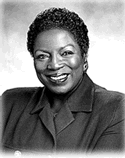Bev Smith: Queen of Black talk radio

Bev Smith became internationally known with her
popular "Our Voices" talk show on Black Entertainment Television
(BET). Currently, she can be heard daily by millions as a national
commentator on the American Urban Radio Network and on the "Night
Talk" radio program. She appears regularly on the popular PBS
show, "To The Contrary," and is now on the internet with a regular
column. Never afraid to bring attention to controversial issues,
she has lived with the homeless, walked the streets with
prostitutes, raised money for babies with AIDS, talked with
inmates on death row and learned to shoot a gun with the FBI. She
was recently in Cincinnati for the kick-off of the new African
American Political Caucus (AAPC) when she sat down with Final Call
contributor Vincent Muhammad.
Final Call (FC): You reach millions of Black
listeners every night on your talk show. What do you think the
impact of your voice is?
Bev Smith (BS): That�s a difficult question
for me to answer because it�s not my voice, it�s God�s voice. All I
know is that I�ve had opportunities to make a lot of money doing
other things but the plight of my people lay heavily on my heart. If
one of us doesn�t make it, all of us haven�t made it. If I have any
impact at all, it would be to try to unite our people, to try and
get them to love each other again, respect each other again, to try
to rise up so that they all know that they were the first man and
woman. Maybe that�s the impact I have.
FC: How important is Black talk radio to the
Black community and why don�t we have more of it?
BS: It�s easier for Black owners to sell
music because white [advertisers] will buy us jigging and boogeying
rather than buy us talking. The importance of the Black talk show is
that it is a voice. We have stopped talking to each other and when
people turn on (a local talk radio personality), they get a chance
to talk to each other, listen to what each other is saying. That
makes a difference. Without Black radio, we would have no way to
talk to each other.
FC: How did you come to be involved in the
African American Political Caucus?
BS: The concept [started] about two years ago
with Dick Gregory, Bev Smith and Dwight Tillery on the telephone.
But, when Tim [Thomas] was killed [recently by a white police
officer], Dwight called us and said now is the time for us to do
something for ourselves. My dream is that we take this concept
started here in Cincinnati and spread it to Detroit, Philadelphia,
my home town of Pittsburgh where white cops have killed people.
Dick, Dwight and I hope that Black people don�t just come out for
this occasion, but will sign those [committee] cards and they�ll
begin to watch. Maybe one committee will watch the school board;
your mayor needs to be watched all the time. We need to bring change
to the police department or more people are going to be killed.
FC: What are your thoughts on BET being bought by
Viacom? Are you concerned about the station you work for being
bought by a major white conglomerate?
BS: I�ll take the second question first. I am
not concerned about the American Urban Radio Networks being sold to
a white conglomerate. My uncle started the dream back in the 1970s�a
man by the name of Walt James, who was the station manager for a
station called WAMA. His manager was a Jewish man who decided that
he didn�t want the stations any more. So my uncle went to the kind
owner of American Urban Radio Networks and five other men. They took
their pennies and their nickels and their dimes and they started
this company. They�re not going to sell it. How do I feel about BET?
This may be a very difficult thing for me to say because I like to
speak the truth. I don�t think that Viacom is going to be any
different than Bob Johnson was. All we�re going to see are videos,
videos, videos, videos. I�m afraid that the jobs that were once held
by young Blacks who were in school to get communication skills will
be going to whites. That�s happening now. VH1 and MTV, it�s all the
same family; and MTV did not play Black videos at all, only Michael
Jackson. Prince had to sue MTV to get them to begin to play other
music. We do not have a Black television station any more. That
breaks my heart because we need a station that will stand up and not
be bought off. And Bob was bought off.
FC: What is the future of Black talk radio?
BS: The future in Black radio depends on
Black people because Black people support the people that are on
radio wherever they are. If Black people let the advertisers on our
show know that they appreciate the support because, financially, we
need their support, it will stay.
FC: Any closing comments?
BS: My only hope and prayer is that
Cincinnati is a beginning and not an end. We have a tendency as
Black people to meet and discuss and regurgitate and regurgitate and
regurgitate the problem. It�s time now for action; it�s time for the
guy that stands on the corner to say, "I�m Black, too. Let me do
something." The theme is what have you done for Black people and me
lately. We ought to ask that question and answer it. That�s my
prayer.
FC: Thank you. |

![]()